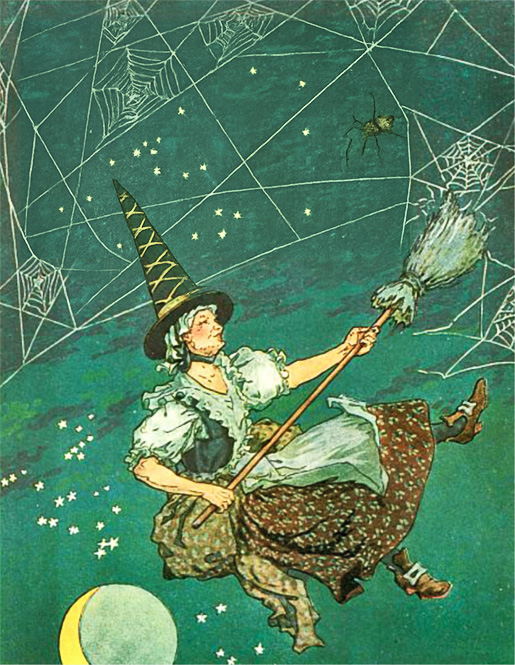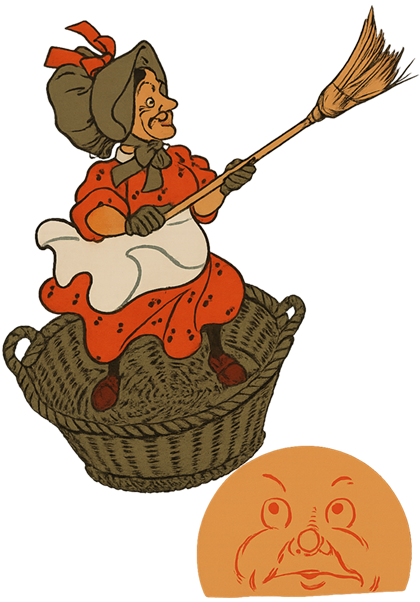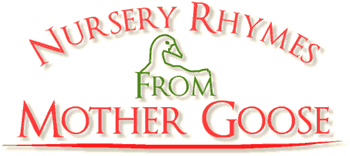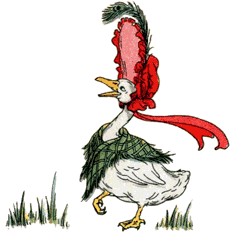There Was an Old Woman Tossed in a Blanket
There was an old woman tossed in a blanket
Seventeen times as high as the moon;
But where she was going no mortal could tell,
For under her arm she carried a broom.
“Old woman, old woman, old woman,” said I,
“Whither, ah whither, ah whither so high?”
“To sweep the cobwebs from the sky,
And I’ll be with you by and by.”

Another version:
There was an old woman tossed up in a basket
Nineteen times as high as the moon;
Where she was going I couldn't but ask it,
For in her hand she carried a broom.
Old woman, old woman, old woman, quoth I,
O whither, O whither, O whither so high?
To brush the cobwebs off the sky!
Shall I go with thee? Aye, by-and bye.
There Was an Old Woman Tossed in a Blanket is one of the strangest rhymes in the nursery canon. The image is outrageous: an old woman flung into the air, higher than the moon, clutching a broom as if she’s on her way to tidy the heavens.
Origins
The rhyme shows up in print in the late 1700s, and James Orchard Halliwell included it in his Nursery Rhymes of England in the 1840s. Where it started is harder to pin down, but the idea of blanket-tossing wasn’t made up for children. It was an old custom — sometimes a rough game at fairs, sometimes a punishment, sometimes just noisy fun. Tossing the “old woman” seventeen times higher than the moon turns that rowdy game into pure nonsense.
The broom under her arm adds another layer. By the eighteenth century, everyone knew the old stories of witches flying through the night on broomsticks. The rhyme seems to borrow a bit of that folklore but twists it into comedy. Instead of flying to meet the devil, this woman is on her way to sweep the cobwebs from the sky.
Meaning
There isn’t really a moral here. It’s nonsense, and that’s the charm. But the broom is a clever touch. Children knew it as a tool for sweeping floors; here it’s being used to “sweep cobwebs from the sky.” A tiny domestic object suddenly has cosmic power. That mix of the ordinary and the impossible is what makes the verse stick.
And of course, there’s the funny contrast: asked where she’s going, the old woman calmly says she’s tidying the heavens. Housework never ends, not even above the moon.
Some commentators have read it differently. They suggest the rhyme may have started as political satire, mocking Henry V’s campaign against France — an effort thought as hopeless as brushing cobwebs out of the sky. Whether or not that’s true, it shows how a verse that began as ridicule could drift into the nursery once the sharp edges wore off.
Cultural Background
 Illustrators couldn’t resist this rhyme. It gave them license to be playful — an old woman rocketing past the rooftops, skirts billowing, a broom tucked under her arm, the moon staring down in surprise. Some added cobwebs tangled among the stars, just to make the joke clearer.
Illustrators couldn’t resist this rhyme. It gave them license to be playful — an old woman rocketing past the rooftops, skirts billowing, a broom tucked under her arm, the moon staring down in surprise. Some added cobwebs tangled among the stars, just to make the joke clearer.
The blanket-toss itself wasn’t invented for the nursery. It was part of real life in village fairs and rowdy gatherings, a kind of rough sport where people were flung into the air on a stretched blanket. The rhyme takes that earthy game and blows it out of proportion — not a few feet off the ground but all the way past the moon.
Legacy
This rhyme never reached the fame of Simple Simon or Sing a Song of Sixpence, but it held its place in nursery collections because it’s so odd. The picture of “sweeping cobwebs from the sky” is one of those images children latch onto. It’s absurd, it’s funny, and once you’ve heard it, you don’t forget it. That strangeness has kept the old woman and her broom alive for more than two centuries.

